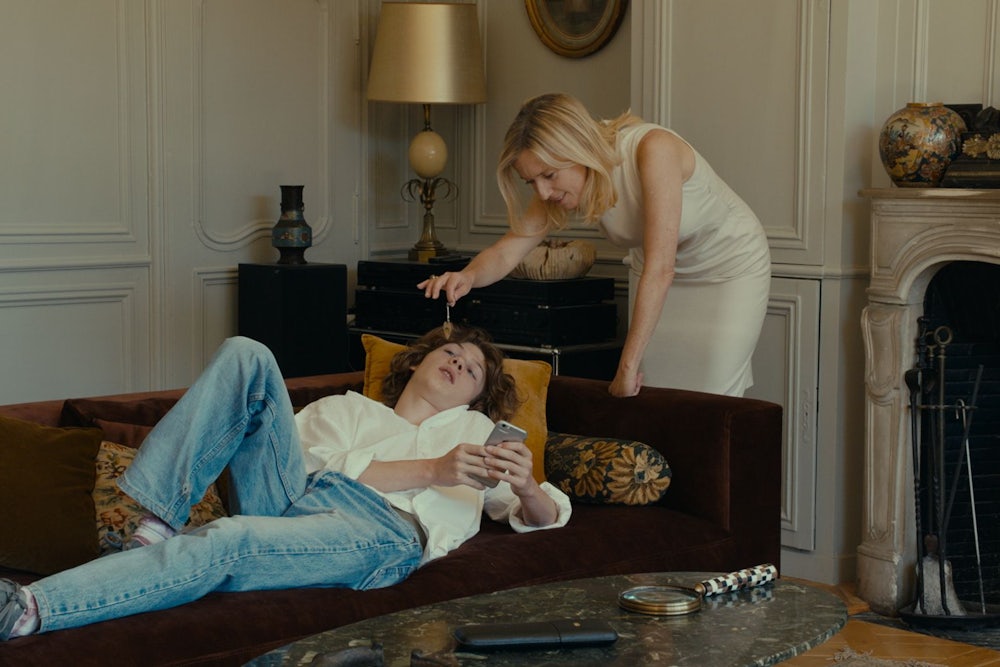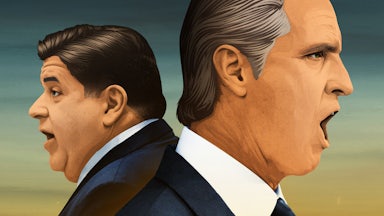Few filmmakers can rival Catherine Breillat’s origin story; by all accounts, the director who would later refer to herself as “the pariah of French cinema” emerged fully formed from her homeland’s subconscious. If she didn’t exist, the French cinema—or at least the wing perennially dedicated to threading together philosophical and erotic provocation—would have to invent her.
In 1968, as a precocious student in Paris, Breillat published a sexually explicit novel entitled L’Homme facile (translated as A Man for the Asking), a book whose contents were deemed too salacious by the French government for readers under the age of 18. Breillat was 17 at the time, meaning that legally she couldn’t purchase a copy of her own magnum opus. A few years later, she acted in Bernardo Bertolucci’s seminal erotic drama Last Tango in Paris, arguably the most controversial movie of the 1970s; while on set, Breillat absorbed aspects of Bertolucci’s mastery as well as his iconoclasm, which she has carried with her through five decades of filmmaking and acerbic self-promotion. “All true artists are hated,” Breillat has said. “Only conformists are ever adored.”
It is, then, a compliment to say that Breillat’s new feature, Last Summer—which chronicles the unexpected and extremely unhealthy relationship between a prosperous middle-aged lawyer and her wayward teenage stepson—is a difficult movie to like, a marvel of toxic lyricism, like a watercolor dabbed with cyanide. It’s also a comeback: Breillat hadn’t made a movie since 2013’s bleak and semiautobiographical Abuse of Weakness, which dramatized the director’s struggles after suffering a debilitating stroke, including being swindled by a notorious con man whom she’d taken as a live-in companion. In that film, Isabelle Huppert brought remarkable shading to Breillat’s unsentimental exercise in self-portraiture, inhabiting the director’s forbidding and restless intelligence while believably evincing physical paralysis. A few years ago, when producer Saïd Ben Saïd (the patron saint of sacred-monster auteurs) approached Breillat to remake the 2019 Danish drama Queen of Hearts, it was not a gesture born of pity but the feeling she could do better by the material.
If Breillat can be said to have a sweet spot, it’s in the arena where impulse wages war against intellect; she’s interested in characters whose basic instincts lead them gloriously astray. In terms of plot, Breillat’s remake (co-written by Pascal Bonitzer) hews closely to its source material, prodding such taboo subjects as grooming, incest, and pedophilia within the confines of a well-heeled domestic melodrama. In terms of scenario and style, the film is far less radical than some of Breillat’s past triumphs: The location, as well as the actors and their wardrobes—all sun-dappled and attractive—could plausibly belong to a more benign sort of art house release (the title, meanwhile, could be a parody). What’s crucial to Breillat’s stewardship of the material is her merciless clarity; the textured, tactile cinematography by Jeanne Lapoirie feels like a manifestation of the filmmaker’s lucid worldview.
There has always been a certain strain of French cinema that likes to spoof—or skewer—what Luis Buñuel identified as the “discreet charm of the bourgeoisie,” but it never appears that Breillat (whose best work ranks with Buñuel’s) is scoring points off her well-heeled ensemble. Instead of working overtime to expose her characters’ selfishness or hypocrisy, she takes such flaws as a given—a starting point—and then uses drama to map their fears and desires. There is a sense in which Breillat is ultimately a humanist: In her cinema, all people are created equally capable of anything. In a moment when many viewers seem unwilling—or unable—to engage with fictional narratives that diverge from their own intellectual or ideological perspectives, Breillat’s ruthless instincts as both a dramatist and an (anti-)moralist have a tonic, almost cleansing effect. It’s rare to watch a movie with so little interest in ingratiating itself to an audience, and which holds us, viselike, all the same.
The opening shot sets the tone: the hard, staring eyes of attorney Anne (Léa Drucker) as she scrutinizes a teenage female client, whose own gaze is cast shamefully downward. Anne, who is in her early fifties and evidently successful, specializes in cases involving sexual coercion; she’s familiar with the myriad ways that (male) attorneys will work to put the plaintiff on trial. “Just be aware, the defense will try to portray you as a world-class slut,” she explains, with a bluntness that might seem uncalled for if not for the fact that we see her win the case.
The idea of Anne as a woman who protects adolescents from a harsh world follows her back home and into the next scene, where her husband, Pierre (Olivier Rabourdin), informs her that his 17-year-old son has been arrested, and that the boy is going to come live with them and their adopted twin daughters. Evidence that the “problem child” is on the premises accrues shortly in the form of dirty socks, a discarded sweatshirt, and crushed soft drink cans. “Haven’t you grown?” asks Anne not-so-rhetorically as Théo (Samuel Kircher) emerges from the shower, his slender torso bisected by a dragon tattoo. “Yeah,” he replies, absent-mindedly wiping his lips and, like the girl in the previous sequence, looking at the floor. “It’s cool.”
As played by Kircher, Théo is cool in a way that plenty of viewers will find familiar, seductive, and exasperating—a moody, self-absorbed brat who knows how and when to lean into his black-sheep status. He’s a bad liar, but also a compulsive one, and when Anne discovers he is responsible for an ostensible break-in, we wonder why she’s willing to forgive—and enable—his treachery, especially since he treats her less like a surrogate mother than like a live-in maid (or else is too aloof to know the difference). And yet: Anne sees something in Théo, and, whatever it is, it draws her in to the point where her looks are a bit too lingering—which he notices and reciprocates. The implication is that the boy has grown up without maternal love, but Anne isn’t filling a void so much as creating a vortex. Sitting with Théo in the garden one afternoon, she lets him improvise an ad hoc tattoo on her forearm; when he chides her squirming (“Do you think the Mona Lisa moved all the time?” he asks), her face registers delight, embarrassment, and terror—expressions that start returning even when she is alone.
Considering her reputation as a master of discomfiting sex scenes—including the remarkable long-take deflowering sequence in 2001’s Fat Girl, which was so anxiously, harrowingly realistic that it inspired a second feature partially about the conditions of its production (Sex Is Comedy, in 2002)—Breillat arguably holds back a bit when it comes to showing Anne and Théo’s inevitable sex scenes; in one, we get an extended close-up on Drucker’s face, her eyes closed, her ecstasy apparent but remote, to us as well as possibly to herself. What’s harrowing about the film’s second half is not the explicitness of the various events (including a few more trysts under the noses of family and friends alike), but the way even mundane or comfortable images become pressurized with guilt and dread. A shot of husband and wife casually eating lunch in the sunshine while Théo lurks shirtless in the background behind a glass door is like something out of a horror movie; even though Anne is in the foreground, the composition seems ripped out of her own fraught, guilt-stricken subconscious.
If there’s a single question hanging over the action in Last Summer, it’s at once vexingly complicated and bluntly obvious: Why would Anne, who has devoted her life to holding sexual predators to account, engage in behavior that even a sympathetic observer would surely place along a similar continuum? It may be that the answer is embedded in the question—that so many years of exposure to the methods and rhetoric of exploitation have cultivated a kind of perverse curiosity—but Breillat isn’t necessarily interested in psychoanalyzing her characters (or playing with layers of irony as Todd Haynes does in May December). The point of her greatest film, Romance, was that the more its protagonist indulged and hypothesized her various desires, the less she was able to understand them.
Breillat’s cool, discursive side is part of her artistry, and sometimes it yields intricately conceived curiosities like her fairy-tale riffs Bluebeard and The Sleeping Beauty—postmodern edifices that exist to be deconstructed. Where she really pushes boundaries is when she stages illicit hookups between realism and abstraction, as in Fat Girl, a work of naturalism that careens over the edge into different territory, including an ending that manages to be shocking, hilarious, tragic, unlikely, and unreliable all at once.
Last Summer doesn’t possess that kind of escape hatch, and what’s at stake in the scenes after Pierre begins to suspect his wife of sleeping with his son is not theoretical or symbolic. The logic of the fallout, which is nasty, brutish, and swift, belongs to the world the characters occupy, which is recognizably our own. It could be argued that, insofar as Breillat is a filmmaker preoccupied with sex, her true subject is power, and while some viewers will surely be startled by the film’s refusal to literally or figuratively judge Anne—either directly or by proxy—for her actions, it’s hard to read the final scenes as anything but critical of larger structures that enable the people who make and maintain the rules to bend them.
In one extraordinarily acted sequence, Breillat shows us how, when it comes to matters of both marriage and parenthood, good and bad faith can interlace on a molecular level alongside honesty and denial, with lies and truths essentially amounting to the same thing: intimacy weaponized more woundingly (and convincingly) than in Justine Triet’s Anatomy of a Fall. This is a film in which nobody really deserves what happens to them, good or bad, and yet somehow everybody gets what they want, like it or not. The final line—a sharp but resigned instruction to “be quiet”—hits the precise, devastating note of self-conscious repression required to set everything in its right place: the terrible, irresistible allure of keeping one’s mouth (and eyes) wide shut.




